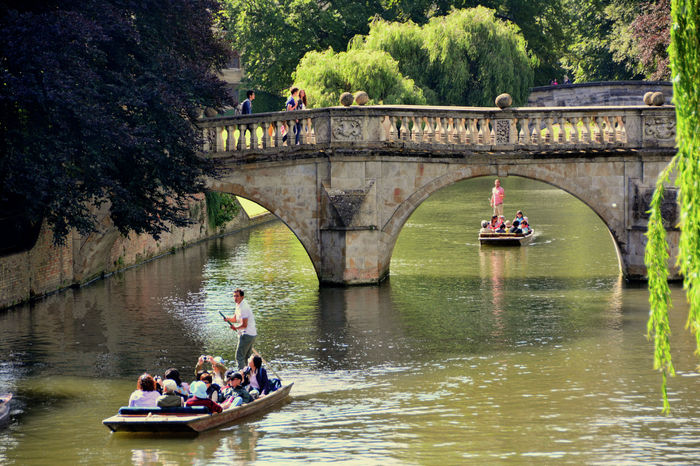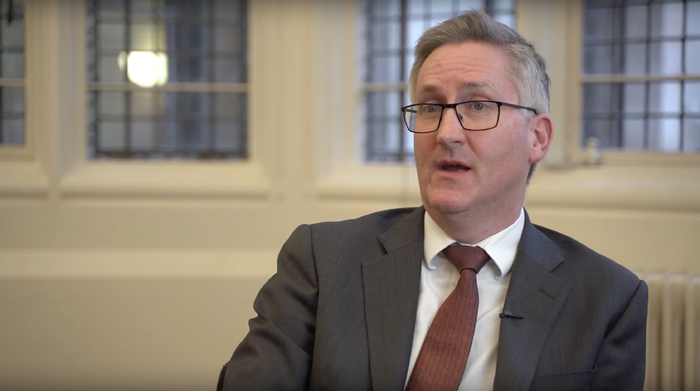Graham Virgo explains 2020-21 plans ‘to get as many students in Cambridge as we possibly can’
Lectures will be online but the University hopes for supervisions, seminars and practicals to continue in person

Following the media interest in the University’s online-only approach to lectures, as revealed by Varsity yesterday, staff, students and the wider public were left with many questions about University life in the forthcoming academic year. Varsity has spoken to the Pro-Vice-Chancellor for Education, Graham Virgo, following yesterday’s disclosure.
Returning to Cambridge
Virgo explained that the University’s current stance is underpinned by the hope that there will be “as many students as possible” in Cambridge for the start of the next academic year.
There are no plans to distinguish between subjects. He explained: “We want all students who possibly can to be in Cambridge in October, regardless of their subject.”
He added a caveat that current plans for research PhD students would be different, as laboratories will be among the first buildings to reopen as early as June. Varsity understands that planning is currently underway to introduce shift patterns of working in laboratories in order to comply with social distancing regulations.
It is hoped that other research students will be able to return after lab-based PhD students. “Arts, humanities and social science students will not be forgotten,” Virgo added.
"The best possible lecturing and teaching experience"
Virgo explained that “moving to online teaching in Easter Term was responding to an emergency” in which the University was focused on “doing enough.”
He stated that, for the 2020-21 academic year, “good enough will not do, it’s got to be the best possible lecturing and teaching experience that it can be.”
“We will see in October as to how we can run a library in a socially-distant way”
The repurposing of lecture halls to provide ‘studios’ for the recording of lectures is being considered but the Pro-Vice-Chancellor recognised that “there might be some cases where some people might need to record lectures from a laptop at home if they are confined to home, depending on what will happen.”
Lectures will be online but “everything else,” including supervisions, seminars and practicals, “will be available.” Virgo stated that it was essential colleagues work hard to ensure a holistic “teaching package” is “as good as it can be.”
There is a “recovery plan for reopening libraries as soon as it is safe to do so and within the context of social distancing.”
“We will see in October as to how we can run a library in a socially-distant way.” He said that the University is “confident” that libraries will reopen but “how you access resources will be different.”
If a deferral request is motivated by “concerns about the pandemic and what the educational experience is going to be like, we are not making any decisions about that yet”
He described that this could mean some course elements “might not actually be delivered as lectures”, instead potentially being offered through “online materials” to represent a “blended learning” experience.
This might then involve students learning through online materials before meeting up in person in a “socially distanced teaching space” for a discussion of the content. He said that this may result in some courses becoming “more interactive”, but would vary from subject to subject.
Tuition Fees
Cambridge will continue to charge normal fees for students in the next academic year. Home students will pay £9,250 per year and higher fees will continue for international students.
Virgo emphasised that “the tuition fee of £9,250 is less than half the cost of an undergraduate education so students are contributing through tuition fees to the cost of their education.”
This statement refers to an average figure of students across all subjects. Teaching in the sciences is consistently higher than it is amongst other disciplines.
The continuation of higher fees for international students is “consistent with many other universities as well,” he added.
Staff support for online lectures
The University has established a group to explore the “remote learning, teaching and assessment” which has begun to evaluate online teaching this term. The University is conscious of “the pressures on staff” in the move to online teaching.
The Cambridge Centre for Teaching and Learning will provide staff with pedagogical support in preparing resources.
He proposed that the situation offers “one-form of lecturing” so staff would not be required to lecture in person as well as providing resources online. It has not yet been decided what software will be used for the online delivery of lectures.
Pre-admission
In response to Varsity’s question about the University’s stance around potential inequalities in predicted grades, Virgo explained that he is “very concerned” about how the Covid-19 pandemic could disadvantage underrepresented groups.
There is concern that students from disadvantaged backgrounds often perform better in exams than their predicted grades would indicate. Virgo sought to provide reassurance that predicted grades would have “a form of moderation.”
Virgo also stated he was “really concerned” that the current Covid-19 disruption to education for school and college-age children will disproportionately harm underrepresented groups in the longer term.
“Their education stopped in March”, a cessation which could cause difficulties for students who benefit from the “educational support” provided by schools. Virgo explained that the University “are looking hard at what we can do to support those students, both those who are expecting A-Level results now and those coming through in the future”.
Discussions are currently underway about how the University can respond in the future to the current disruption to education. The University participated in the UCAS adjustment scheme for the first time last year, which admitted 67 students who had marginally missed their offer requirements. Virgo explained that “the intention is that the adjustment scheme can still operate this year.”
Deferred entry
The University is adopting a nuanced approach to requests to defer entrance to Cambridge, in which distinction will be made on the basis of the reason for the request.
Virgo explained that if an offer holder requests to defer their application “on the back of the pandemic, or uncertainty about what the next academic year will look like, we are not making any decisions about that now. That will be considered later in the summer.”
“This does not rule out people who would like to defer for other reasons,” such as those diagnosed with a serious illness or with difficult domestic situations. These requests would be “considered in the normal way.”
However, if a deferral request is motivated by “concerns about the pandemic and what the educational experience is going to be like, we are not making any decisions about that yet,” adding that a decision was likely “later in the summer, potentially August time.”
He clarified that this position was the same for those with an offer for both undergraduate and postgraduate courses.
Online lecture copyright issues
Virgo was also asked about the University’s stance on lecture capture software given that some staff had previously raised concerns around copyright issues. Students and campaign groups have previously campaigned for lecture capture as it can increase access for those with disabilities and mental health concerns.
The Pro-Vice-Chancellor stated that there had been “some staff concerns about whether they would want to be recorded”, but that now the University was “not resisting lecture capture.”
Virgo stated he had personally been working on a project to roll out the software, and uptake had been “slow” so far. He noted, however, that some STEM subjects had “participated in the pilot” and as a result now have lecture capture provisions.
“We absolutely want students to come back to Cambridge and this is what the planning is focusing on”
In January, Varsity reported that non-STEM subjects had been offered the chance to join a University scheme to further facilitate lecture capture across all Faculties. The Covid-19 pandemic has provided new urgency to resume these conversations.
Responding to concerns around about copyright issues and the possibility that this would make some unwilling to participate in video lectures, Virgo explained that the University is “not requiring it of any staff, it is absolutely staff opt-in if they wish to participate.”
“What we have said for this [Easter] term is that inevitably because students are all round the world, we have to record the lectures to make them available” and the “intention” for next year is that “lectures will be captured, they will be recorded” but that “there will be other methods of teaching around them.”
Housing Policy
Responding to concerns raised by some students that college accommodation might be limited to a percentage of full capacity in the 2020-21 year, Virgo said that the intention “absolutely is that we want students to come back to Cambridge and this is what the planning is focusing on”.
He stated that online lectures “didn’t mean no residency,” only that students would not be in lecture theatres.
With regards to capacity, he stated that the colleges were currently examining how social distancing might affect students’ ability to physically reside within them, and that these considerations were “focusing much more on what constitutes a household.”
The occupancy percentage of college accommodation has not yet been determined, but would be “much higher” than the figure of 25% which will be used over the next month for the imminent return to laboratories for research students.
PhD Students
Virgo was asked if PhD students, whose ability to continue with research may have been curtailed by lab closures and the inability to carry out fieldwork, will be able to apply to extend their final submission date.
He said that the University is currently working on a “protocol” for both extensions and funding issues which students may face as a result of the pandemic. He explained that the approach would be “light touch” and that with time delays students individual cases would be taken into account.
On funding, Virgo described that he had spoken to Cambridge-based funding bodies – including the Gates Foundation, Cambridge Trust, and Colleges – as well as UK Research and Innovation (UKRI).
He explained that financial hardship issues would be “considered on a case by case basis” but that for students experiencing financial hardship as a result of the coronavirus, funding bodies “have said, of course, ‘we will do what we can’.”
In April, Virgo told Varsity that transcripts for undergraduate students graduating this year would indicate that their exams were sat during ‘the Covid examination period’. When asked if PhD students would have similar consideration to reflect any differences in award due to the pandemic, Virgo stated that he “would want to consult widely” with students on this.
 News / Judge Business School advisor resigns over Epstein and Andrew links18 February 2026
News / Judge Business School advisor resigns over Epstein and Andrew links18 February 2026 News / Gov grants £36m to Cambridge supercomputer17 February 2026
News / Gov grants £36m to Cambridge supercomputer17 February 2026 News / CUCA members attend Reform rally in London20 February 2026
News / CUCA members attend Reform rally in London20 February 2026 News / Union speakers condemn ‘hateful’ Katie Hopkins speech14 February 2026
News / Union speakers condemn ‘hateful’ Katie Hopkins speech14 February 2026 News / Hundreds of Cambridge academics demand vote on fate of vet course20 February 2026
News / Hundreds of Cambridge academics demand vote on fate of vet course20 February 2026












